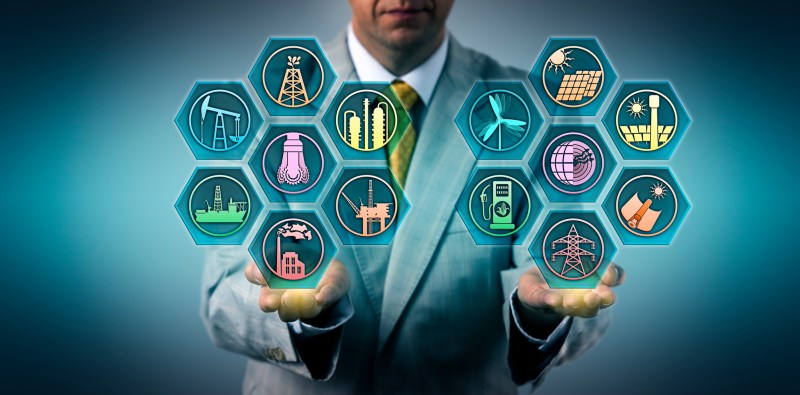To compliment the technical program, we are introducing dedicated sessions on carbon storage regulation, critical minerals and lessons learnt from the implementation of flagship projects. These dedicated sessions will welcome keynote speakers to share their insights and provide valuable perspectives within the conference theme of ‘Accelerating the path to a sustainable energy future’.
Energy transition and related technologies will create a strong demand for mineral resources. Technologies such as Electric Vehicles or Offshore wind farms, or the infrastructure for electrification will need large quantities of critical and strategic
materials such as Lithium or Copper, both in variety and in volume. This demand will come on top of the requirements for the digital transition.
The requirements are such that experts anticipate that the global offer will have difficulties meeting this demand, despite important reserves. Europe is nowadays strongly dependent on imports in order to meet its needs in critical materials.
Considering these challenges, the solutions are on two levels:
– Securing the supply chain, by diversifying and securing contracts, applying mineral intelligence to identify supply chain risk, while increasing the environmental performance of these contracts
– Finding new and local resources, respectful of sustainability values, by finding innovative way of producing minerals locally, including by recycling.
Matteo Loizzo Consultant
Georges Tijbosch
Chief Executive Officer
MiQ
Harry Whitaker
Manager Rest of Asia Regulatory Affairs
Shell Energy Asia
Léon Beugelsdijk
Front End Development Manager
Shell
Date
15 November 2023
Time
15:35 – 17:00 CET

Carbon capture, utilization and storage (CCUS) technologies are set to play an important role in putting the global energy system on a path to net zero. Successfully deploying CCUS relies on the establishment of legal and regulatory frameworks to ensure the effective stewardship of CCUS projects (business development & planning) + activities (execution) and the safe and secure storage of CO2.
Several countries have already developed comprehensive legal and regulatory frameworks for CCUS and others are working on draft regulations. The former provides a valuable knowledge base for the countries that still have to establish a legal foundation for CCUS. Furthermore, existing frameworks are also being tested as more commercial CCUS projects are developed, with important learnings for regulators.
Policy-driven CCUS deployment will enable projects to get started in many countries and grow the few dozen carbon capture facilities operating today into a true industry supporting country,
regional and global decarbonization targets. Climate Finance and Just Energy Transition are key themes of the COP agenda and there is a strong drive for international working groups to share key learnings and accelerate deployment of CCUS. Smaller countries seeking financing are encouraged to form closer collaborative working partnerships with countries such as Norway, the United States, UK, Canada and Australia, including joint working on policy
incentivization and regulation, innovation and carbon dioxide transport and storage solutions.
The focus of the session will be on highlighting recent developments in CCS regulation like the review of the EU Directive guidance documents, the establishment of standards in the Netherland for the seismic & geomechanical containment component of the Storage Licence Applications as well as updates to the ISO TC 265 as well as SPE SRMS. Not forgetting to focus on Operator´s requirements and new drafts regulations in progress.
Emer Caslin
Business Development Manager
iCrag
Peter Goerke-Mallet
Research Center of Post-Mining
TH Georg Agricola
Henk Jaap Kloosterman
Head of Strategic Accounts, Learning and Development
RPS Energy
Maren Kleemeyer
Learning Advisor Geophysics
Shell
Lucia Levato
Founder & President
LUSVAL
Tobias Rudolph
Research Center of Post-Mining
TH Georg Agricola
Date
16 November 2023
Time
16:10 – 17:35 CET

Following an excellent range of presentations at GET ‘22 introducing aspects and plans for carbon storage, one year on we review progress towards implementation for CCS projects, from a variety of perspectives. In this flagship session, you will hear commentary from regulators and operators for industry-leading and ‘first of a kind’ projects, sharing knowledge gained and lessons learned through consultation, commitment, failure implementation, and the pathway towards ‘first injection.’
The session will cover the full CCS cycle, from regulator, to prospect and storage site identification, license application, project design and stakeholder engagement, implementation and CO2 pilot injection monitoring. Speakers will include regulators and CCS operators. The session will focus on NW Europe offshore and include aspects of geoscience and subsurface engineering. Following the speaker presentation, a round table panel discussion will allow further analysis of the topics covered and invite questions from the audience.
Philippe Dumas
Secretary General
EGEC
Suzanne Hurter
Senior Scientist Specialist
TNO
Maarten Vanneste
Principal Geoscientist / Head of Section Geohazards & Dynamics
NGI
Luca Masnaghetti
Global Business Manager
SLB
Wouter Schiferli
Flow Assurance / Process Engineer (CCUS)
EBN
Glen Burridge
Executive Director
European Federation of Geologists
Date
17 November 2023
Time
15:35 – 17:00 CET

EAGE is the largest global community of research and industry geo-professionals dedicated to supporting a multi-disciplinary approach to the investigation of the Earth’s subsurface.
Environmental Data Scientist Energy Transition and Environment at CGG
Co-chair Geothermal Energy Conference
Saba Keynejad received her Master’s degree in mineral exploration with a focus on geothermal exploration in 2012. She obtained her PhD from the University of Arizona in 2018, developing machine learning approaches for subsurface characterization. Since then, Saba has worked in the energy sector, contributing to projects in subsurface analysis and geothermal research. Currently, she applies her expertise to providing environmental solutions and advancing sustainable practices in energy, mining, and other major industries. Beyond technical work, Saba has been actively involved in leading conferences and webinars within her company and externally. She aims to facilitate interdisciplinary collaboration through these events. Saba also participates in mentorship schemes focused on women of color in the energy and technology industry. As co-chair of EAGE GET2024, Saba brings a wealth of experience spanning academia, industry, and leadership. She looks forward to bringing together geothermal experts to drive the field forward through open dialogue and partnership. Saba is honored to help convene important discussions on the conference stage.
COO | Geoscience at EPI Group
Co-chair Geothermal Energy Conference
Dr. Gehrig Schultz has been actively involved in using geophysics to solve geological and engineering problems since 1986. Dr. Schultz is currently COO for Geosciences at EPI Group where he leads a multidisciplinary team specialized in applying geophysics to geothermal energy, nuclear waste disposal, near surface engineering and hydrocarbons exploration and field redevelopment. He has worked both as a service provider and as a senior energy company executive. His experience spans growing former Romanian state owned geophysical and geological enterprise to become a highly respected international geophysical supplier with annual revenues of over € 100 million, rejuvenating a producing hydrocarbons field, starting a cased whole logging and well maintenance company, and technical leadership of several startup companies. Gehrig recently earned a PhD in Geophysics from the University of Bucharest and graduated with a BS in Geophysical Engineering from the Colorado School of Mines.